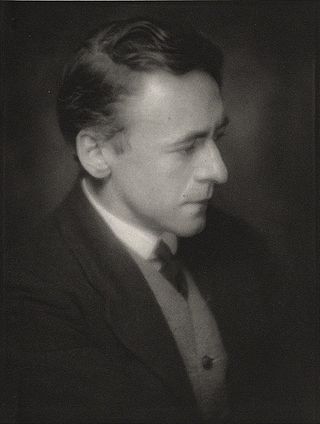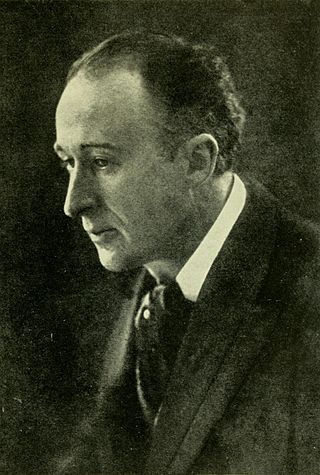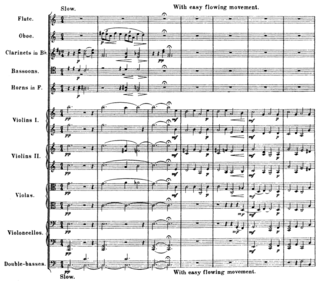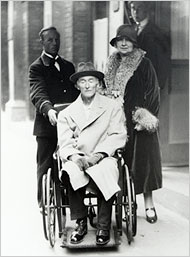Related Research Articles

Sir Arnold Edward Trevor Bax was an English composer, poet, and author. His prolific output includes songs, choral music, chamber pieces, and solo piano works, but he is best known for his orchestral music. In addition to a series of symphonic poems, he wrote seven symphonies and was for a time widely regarded as the leading British symphonist.

Frederick Theodore Albert Delius was an English composer. Born in Bradford in the north of England to a prosperous mercantile family, he resisted attempts to recruit him to commerce. He was sent to Florida in the United States in 1884 to manage an orange plantation. He soon neglected his managerial duties, and in 1886 returned to Europe.

Ferdinand Rudolph von Grofé, known as Ferde Grofé was an American composer, arranger, pianist, and instrumentalist. He is best known for his 1931 five-movement symphonic poem, Grand Canyon Suite, and for orchestrating George Gershwin's Rhapsody in Blue for its 1924 premiere.

Philip Arnold Heseltine, known by the pseudonym Peter Warlock, was a British composer and music critic. The Warlock name, which reflects Heseltine's interest in occult practices, was used for all his published musical works. He is best known as a composer of songs and other vocal music; he also achieved notoriety in his lifetime through his unconventional and often scandalous lifestyle.

Eric William Fenby OBE was an English composer, conductor, pianist, organist and teacher who is best known for being Frederick Delius's amanuensis from 1928 to 1934. He helped Delius realise a number of works that would not otherwise have been forthcoming.

En saga, Op. 9, is a single-movement tone poem for orchestra written from 1891 to 1892 by the Finnish composer Jean Sibelius. The piece, which likely began as a septet or octet for flute, clarinet, and string ensemble before evolving into an orchestral tone poem, premiered on 16 February 1893 in Helsinki with Sibelius conducting the Helsinki Orchestral Association. A decade later in 1902, Sibelius substantially revised En saga in response to an invitation from Ferruccio Busoni to conduct the piece in Berlin. It thus stands alongside The Lemminkäinen Suite (Op. 22), the Violin Concerto (Op. 47), The Oceanides (Op. 73), and the Fifth Symphony (Op. 82) as one of the most overhauled works in his œuvre. The Berlin concert, which occurred a fortnight after Robert Kajanus had premiered the revised version in Helsinki on 2 November, finally brought Sibelius the German breakthrough he had long desired.
Patrick Arthur Sheldon Hadley was a British composer.

On Hearing the First Cuckoo in Spring is a tone poem composed in 1912 by Frederick Delius. Together with Summer Night on the River it is one of Delius's Two Pieces for Small Orchestra. The two were first performed in Leipzig on 23 October 1913, conducted by Arthur Nikisch.On Hearing the First Cuckoo in Spring is the longer of the two pieces, with a typical playing time of between six and seven minutes. There have been numerous recordings of the piece, which Delius's champion Sir Thomas Beecham described as much the best known of the composer's works.
Paris: The Song of a Great City is a nocturne for orchestra composed by Frederick Delius over the period of 1899–1900. Hans Haym, to whom Delius dedicated the work, conducted the premiere on 14 December 1901 in Elberfeld, Germany. Sir Thomas Beecham conducted the UK premiere of the work in Liverpool on 11 January 1908. The critical edition of the score, published in the late 1980s, incorporated revisions by Beecham, and included editorial work from Eric Fenby and Norman Del Mar.

Hélène Sophie Emilie Rosen, later known as Jelka Delius, was a German painter, best known as the wife of the English composer Frederick Delius.

Koanga is an opera written between 1896 and 1897, with music by Frederick Delius and a libretto by Charles Francis Keary, inspired partly by the book The Grandissimes: A Story of Creole Life by George Washington Cable (1880). Inspiration also came from Delius's own experiences as a young man, when his family sent him to work in Florida. It was Delius's third opera, and he thought better of it than of its predecessors, Irmelin and The Magic Fountain, because of the incorporation of dance scenes and his treatment of the choruses. Koanga is reputed to be the first opera in the European tradition to base much of its melodic material on African-American music.

Edward Geoffrey Toye, known as Geoffrey Toye, was an English conductor, composer and opera producer.
Sea Drift is among the larger-scale musical works by the composer Frederick Delius. Completed in 1903–04 and first performed in 1906, it is a setting for baritone, chorus and orchestra of words by Walt Whitman.

Song of Summer is a 1968 black-and-white television film co-written, produced, and directed by Ken Russell for the BBC's Omnibus series which was first broadcast on 15 September 1968. It portrays the final six years of Frederick Delius' life, during which Eric Fenby lived with the composer and his wife Jelka as Delius's amanuensis. The title is borrowed from the Delius tone poem A Song of Summer, which is heard along with other Delius works on the film's soundtrack.
A Mass of Life is a cantata by English composer Frederick Delius, based on the German text of Friedrich Nietzsche's philosophical novel Thus Spoke Zarathustra (1883-1885). In 1898, Delius had written a male choir and orchestral setting of "Midnight Song" from the same work, and this was revised to form part of the Mass.

The Requiem by Frederick Delius was written between 1913 and 1916, and first performed in 1922. It is set for soprano, baritone, double chorus and orchestra, and is dedicated "To the memory of all young artists fallen in the war". The Requiem is Delius's least-known major work, not being recorded until 1968 and having received only seven performances worldwide by 1980.
Cynara is a setting by Frederick Delius of a poem by Ernest Dowson, for solo baritone voice and orchestra.
Songs of Sunset is a work by Frederick Delius, written in 1906–07, and scored for mezzo-soprano and baritone soli, SATB chorus and large orchestra. The words are by Ernest Dowson.
This is a summary of 1928 in music in the United Kingdom.